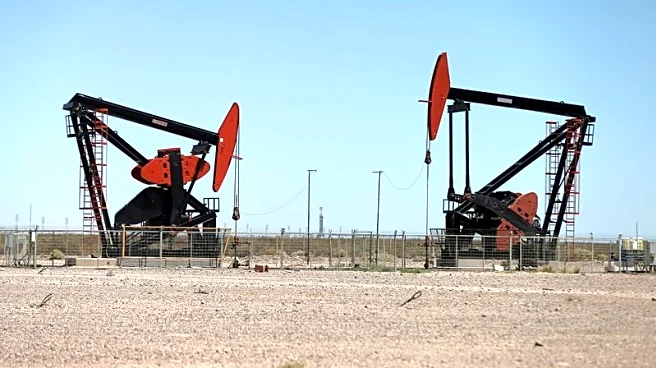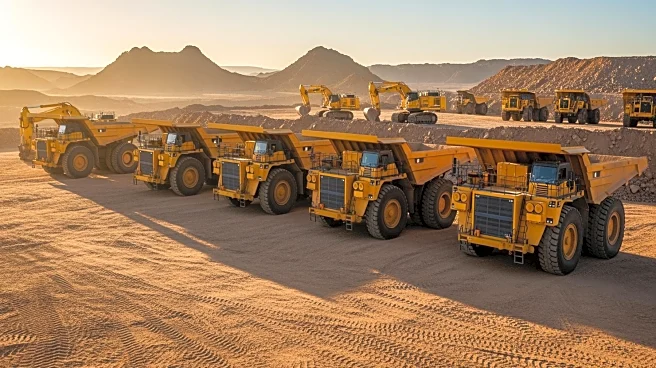BUENOS AIRES (Reuters) -Drilling and fracking activity in Argentina's Vaca Muerta, the world's fourth-largest unconventional oil reserve, is plateauing due to lower oil prices and rising costs, a slowdown
that could complicate the political agenda of libertarian President Javier Milei.
The huge Vaca Muerta formation in western Argentina accounts for 64% of the country's oil production even though only 8% of it is under development.
It is vital to Argentina's economic future and Milei's government, which needs to increase the country's energy exports to bolster Argentina's dollar reserves and build confidence in the government's ability to maintain a stable currency.
Slowing drilling and fracking in Vaca Muerta may add to challenges facing Milei, whose approval levels have dipped amid political scandals and clashes with the opposition-controlled Congress, and his plan to export $30 billion in oil and gas by 2030 - doubling Argentina's global exports from current levels.
Major investments in Vaca Muerta resulted in record Argentine production levels of 827,000 barrels per day in August - a 15% increase from a year earlier - but analysts expect a slowdown in coming months. Benchmark global oil prices are trading around $65 per barrel, down from $90 a barrel in April 2024.
The number of wells drilled in Neuquen basin, where Vaca Muerta is located, fell to 55 in July from 67 in June, the third consecutive monthly decline, according to the most recent data from Argentine consulting group AGKC.
Fracking stages - which involve injecting water and chemicals at high pressure to break rocks - in Vaca Muerta fell 9% in July compared to the previous month, according to Luciano Fucello, country manager for NCS Multistage, an oilfield services company.
In an early September presentation to oil and gas executives, Daniel González, Argentina's Secretary of Energy and Mining Coordination, said oil production costs in Vaca Muerta were 35% to 40% higher than in the Permian formation in the United States.
"The market will adjust and we'll return to more reasonable prices, but in the meantime, the most efficient will survive," said González.
Analysts blamed higher prices for labor, services and utilities and more expensive financing for the growing costs.
FEWER DRILLED WELLS
While the industry had expected fracking stages to reach 24,000 by 2025, NCS Multistage's Fucello said that projection would fall several thousand short.
"At this dollar level, at this interest rate level, it's better to keep the barrel of oil down and not extract it," said Ariel Kogan, director of AGKC Consultores.
Kogan said many market participants expect a change in exchange rate policies, which would make extracting crude more profitable, after Argentina's October midterm elections.
Delgado Industrias in Buenos Aires province, which supplies steel inputs to the oil industry, told Reuters it has seen a 40% drop in sales from 2024 due to the slowdown in oil well drilling and shale fracking, as well as increased competition with Chinese exporters.
Business leaders say profitability is declining due to rising labor and production costs combined with a relatively stronger peso, which means profits from dollar-denominated oil sales are lower. They have called for labor reform to reduce the cost of hiring and firing workers.
Duralitte, an oil, gas and mining component manufacturing company, has stopped exporting from its three industrial plants in Argentina because it can manufacture cheaper products in Brazil and the U.S., founder Gustavo Rossi told Reuters. He called for lower taxes.
Large oil companies operating in Argentina such as Chevron, Tecpetrol and TotalEnergies have urged Milei's government to adopt policies that guarantee exports will not be restricted.
They also want the government to eliminate foreign currency controls that limit access to dollars, in order to attract greater foreign investment and reach the government's production target of 1.5 million bpd.
Milei has sought to create incentives for large investments and loosen restrictions for companies to pay dividends. But some major international companies, such as Exxon Mobil, have decided to sell their assets in Vaca Muerta or are considering doing so.
"It's important that we have stability and predictability for the future, and that we can continue to lift the exchange controls so that companies like ours can continue not only investing but also distributing dividends," Sergio Mengoni, CEO of TotalEnergies in Argentina, told reporters at a conference in September.
(Reporting by Eliana Raszewski, Writing by Leila Miller; Editing by Marianna Parraga and Nia Williams)









